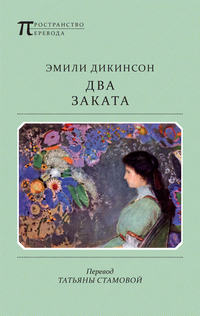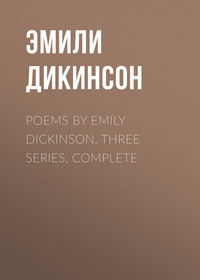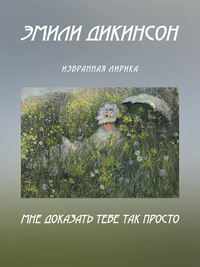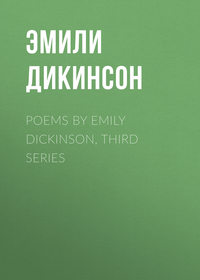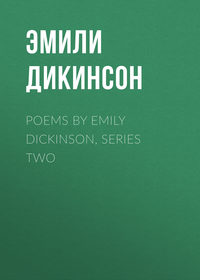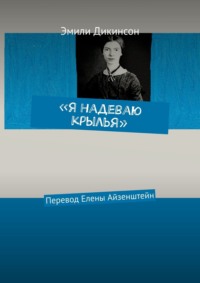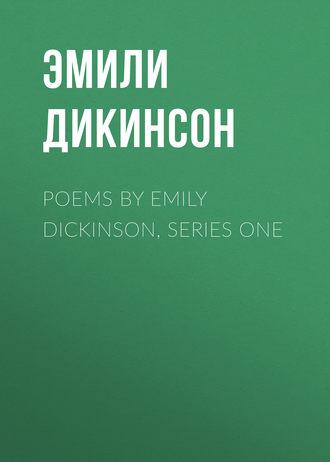 полная версия
полная версияPoems by Emily Dickinson, Series One

Emily Dickinson
Poems by Emily Dickinson, Series One
PREFACE
THE verses of Emily Dickinson belong emphatically to what Emerson long since called "the Poetry of the Portfolio,"—something produced absolutely without the thought of publication, and solely by way of expression of the writer's own mind. Such verse must inevitably forfeit whatever advantage lies in the discipline of public criticism and the enforced conformity to accepted ways. On the other hand, it may often gain something through the habit of freedom and the unconventional utterance of daring thoughts. In the case of the present author, there was absolutely no choice in the matter; she must write thus, or not at all. A recluse by temperament and habit, literally spending years without setting her foot beyond the doorstep, and many more years during which her walks were strictly limited to her father's grounds, she habitually concealed her mind, like her person, from all but a very few friends; and it was with great difficulty that she was persuaded to print, during her lifetime, three or four poems. Yet she wrote verses in great abundance; and though brought curiously indifferent to all conventional rules, had yet a rigorous literary standard of her own, and often altered a word many times to suit an ear which had its own tenacious fastidiousness.
Miss Dickinson was born in Amherst, Mass., Dec. 10, 1830, and died there May 15, 1886. Her father, Hon. Edward Dickinson, was the leading lawyer of Amherst, and was treasurer of the well-known college there situated. It was his custom once a year to hold a large reception at his house, attended by all the families connected with the institution and by the leading people of the town. On these occasions his daughter Emily emerged from her wonted retirement and did her part as gracious hostess; nor would any one have known from her manner, I have been told, that this was not a daily occurrence. The annual occasion once past, she withdrew again into her seclusion, and except for a very few friends was as invisible to the world as if she had dwelt in a nunnery. For myself, although I had corresponded with her for many years, I saw her but twice face to face, and brought away the impression of something as unique and remote as Undine or Mignon or Thekla.
This selection from her poems is published to meet the desire of her personal friends, and especially of her surviving sister. It is believed that the thoughtful reader will find in these pages a quality more suggestive of the poetry of William Blake than of anything to be elsewhere found,—flashes of wholly original and profound insight into nature and life; words and phrases exhibiting an extraordinary vividness of descriptive and imaginative power, yet often set in a seemingly whimsical or even rugged frame. They are here published as they were written, with very few and superficial changes; although it is fair to say that the titles have been assigned, almost invariably, by the editors. In many cases these verses will seem to the reader like poetry torn up by the roots, with rain and dew and earth still clinging to them, giving a freshness and a fragrance not otherwise to be conveyed. In other cases, as in the few poems of shipwreck or of mental conflict, we can only wonder at the gift of vivid imagination by which this recluse woman can delineate, by a few touches, the very crises of physical or mental struggle. And sometimes again we catch glimpses of a lyric strain, sustained perhaps but for a line or two at a time, and making the reader regret its sudden cessation. But the main quality of these poems is that of extraordinary grasp and insight, uttered with an uneven vigor sometimes exasperating, seemingly wayward, but really unsought and inevitable. After all, when a thought takes one's breath away, a lesson on grammar seems an impertinence. As Ruskin wrote in his earlier and better days, "No weight nor mass nor beauty of execution can outweigh one grain or fragment of thought."
–-Thomas Wentworth Higginson
As is well documented, Emily Dickinson's poems were edited in these early editions by her friends, better to fit the conventions of the times. In particular, her dashes, often small enough to appear as dots, became commas and semi-colons.
In the second series of poems published, a facsimile of her handwritten poem which her editors titled "Renunciation" is given, and I here transcribe that manuscript as faithfully as I can, showing underlined words thus.
There came a day – at Summer's full -Entirely for me -I thought that such were for the Saints -Where Resurrections – be -The sun – as common – went abroad -The flowers – accustomed – blew,As if no soul – that solstice passed -Which maketh all things – new -The time was scarce profaned – by speech -The falling of a wordWas needless – as at Sacrament -The Wardrobe – of our Lord!Each was to each – the sealed church -Permitted to commune – this time -Lest we too awkward showAt Supper of "the Lamb."The hours slid fast – as hours will -Clutched tight – by greedy hands -So – faces on two Decks look back -Bound to opposing lands.And so, when all the time had leaked,Without external sound,Each bound the other's Crucifix -We gave no other bond -Sufficient troth – that we shall rise,Deposed – at length the Grave -To that new marriage -Justified – through Calvaries – of Love!From the handwriting, it is not always clear which are dashes, which are commas and which are periods, nor it is entirely clear which initial letters are capitalized.
However, this transcription may be compared with the edited version in the main text to get a flavor of the changes made in these early editions.
—-JT
I.
LIFE
I
[Published in "A Masque of Poets" at the request of "H.H.," the author's fellow-townswoman and friend.]
Success is counted sweetestBy those who ne'er succeed.To comprehend a nectarRequires sorest need.Not one of all the purple hostWho took the flag to-dayCan tell the definition,So clear, of victory,As he, defeated, dying,On whose forbidden earThe distant strains of triumphBreak, agonized and clear!II
Our share of night to bear,Our share of morning,Our blank in bliss to fill,Our blank in scorning.Here a star, and there a star,Some lose their way.Here a mist, and there a mist,Afterwards – day!III
ROUGE ET NOIRSoul, wilt thou toss again?By just such a hazardHundreds have lost, indeed,But tens have won an all.Angels' breathless ballotLingers to record thee;Imps in eager caucusRaffle for my soul.IV
ROUGE GAGNE'T is so much joy! 'T is so much joy!If I should fail, what poverty!And yet, as poor as IHave ventured all upon a throw;Have gained! Yes! Hesitated soThis side the victory!Life is but life, and death but death!Bliss is but bliss, and breath but breath!And if, indeed, I fail,At least to know the worst is sweet.Defeat means nothing but defeat,No drearier can prevail!And if I gain, – oh, gun at sea,Oh, bells that in the steeples be,At first repeat it slow!For heaven is a different thingConjectured, and waked sudden in,And might o'erwhelm me so!V
Glee! The great storm is over!Four have recovered the land;Forty gone down togetherInto the boiling sand.Ring, for the scant salvation!Toll, for the bonnie souls, —Neighbor and friend and bridegroom,Spinning upon the shoals!How they will tell the shipwreckWhen winter shakes the door,Till the children ask, "But the forty?Did they come back no more?"Then a silence suffuses the story,And a softness the teller's eye;And the children no further question,And only the waves reply.VI
If I can stop one heart from breaking,I shall not live in vain;If I can ease one life the aching,Or cool one pain,Or help one fainting robinUnto his nest again,I shall not live in vain.VII
ALMOST!Within my reach!I could have touched!I might have chanced that way!Soft sauntered through the village,Sauntered as soft away!So unsuspected violetsWithin the fields lie low,Too late for striving fingersThat passed, an hour ago.VIII
A wounded deer leaps highest,I've heard the hunter tell;'T is but the ecstasy of death,And then the brake is still.The smitten rock that gushes,The trampled steel that springs;A cheek is always redderJust where the hectic stings!Mirth is the mail of anguish,In which it cautions arm,Lest anybody spy the bloodAnd "You're hurt" exclaim!IX
The heart asks pleasure first,And then, excuse from pain;And then, those little anodynesThat deaden suffering;And then, to go to sleep;And then, if it should beThe will of its Inquisitor,The liberty to die.X
IN A LIBRARYA precious, mouldering pleasure 't isTo meet an antique book,In just the dress his century wore;A privilege, I think,His venerable hand to take,And warming in our own,A passage back, or two, to makeTo times when he was young.His quaint opinions to inspect,His knowledge to unfoldOn what concerns our mutual mind,The literature of old;What interested scholars most,What competitions ranWhen Plato was a certainty.And Sophocles a man;When Sappho was a living girl,And Beatrice woreThe gown that Dante deified.Facts, centuries before,He traverses familiar,As one should come to townAnd tell you all your dreams were true;He lived where dreams were sown.His presence is enchantment,You beg him not to go;Old volumes shake their vellum headsAnd tantalize, just so.XI
Much madness is divinest senseTo a discerning eye;Much sense the starkest madness.'T is the majorityIn this, as all, prevails.Assent, and you are sane;Demur, – you're straightway dangerous,And handled with a chain.XII
I asked no other thing,No other was denied.I offered Being for it;The mighty merchant smiled.Brazil? He twirled a button,Without a glance my way:"But, madam, is there nothing elseThat we can show to-day?"XIII
EXCLUSIONThe soul selects her own society,Then shuts the door;On her divine majorityObtrude no more.Unmoved, she notes the chariot's pausingAt her low gate;Unmoved, an emperor is kneelingUpon her mat.I've known her from an ample nationChoose one;Then close the valves of her attentionLike stone.XIV
THE SECRETSome things that fly there be, —Birds, hours, the bumble-bee:Of these no elegy.Some things that stay there be, —Grief, hills, eternity:Nor this behooveth me.There are, that resting, rise.Can I expound the skies?How still the riddle lies!XV
THE LONELY HOUSEI know some lonely houses off the roadA robber 'd like the look of, —Wooden barred,And windows hanging low,Inviting toA portico,Where two could creep:One hand the tools,The other peepTo make sure all's asleep.Old-fashioned eyes,Not easy to surprise!How orderly the kitchen 'd look by night,With just a clock, —But they could gag the tick,And mice won't bark;And so the walls don't tell,None will.A pair of spectacles ajar just stir —An almanac's aware.Was it the mat winked,Or a nervous star?The moon slides down the stairTo see who's there.There's plunder, – where?Tankard, or spoon,Earring, or stone,A watch, some ancient broochTo match the grandmamma,Staid sleeping there.Day rattles, too,Stealth's slow;The sun has got as farAs the third sycamore.Screams chanticleer,"Who's there?"And echoes, trains away,Sneer – "Where?"While the old couple, just astir,Fancy the sunrise left the door ajar!XVI
To fight aloud is very brave,But gallanter, I know,Who charge within the bosom,The cavalry of woe.Who win, and nations do not see,Who fall, and none observe,Whose dying eyes no countryRegards with patriot love.We trust, in plumed procession,For such the angels go,Rank after rank, with even feetAnd uniforms of snow.XVII
DAWNWhen night is almost done,And sunrise grows so nearThat we can touch the spaces,It 's time to smooth the hairAnd get the dimples ready,And wonder we could careFor that old faded midnightThat frightened but an hour.XVIII
THE BOOK OF MARTYRSRead, sweet, how others strove,Till we are stouter;What they renounced,Till we are less afraid;How many times they boreThe faithful witness,Till we are helped,As if a kingdom cared!Read then of faithThat shone above the fagot;Clear strains of hymnThe river could not drown;Brave names of menAnd celestial women,Passed out of recordInto renown!XIX
THE MYSTERY OF PAINPain has an element of blank;It cannot recollectWhen it began, or if there wereA day when it was not.It has no future but itself,Its infinite realms containIts past, enlightened to perceiveNew periods of pain.XX
I taste a liquor never brewed,From tankards scooped in pearl;Not all the vats upon the RhineYield such an alcohol!Inebriate of air am I,And debauchee of dew,Reeling, through endless summer days,From inns of molten blue.When landlords turn the drunken beeOut of the foxglove's door,When butterflies renounce their drams,I shall but drink the more!Till seraphs swing their snowy hats,And saints to windows run,To see the little tipplerLeaning against the sun!XXI
A BOOKHe ate and drank the precious words,His spirit grew robust;He knew no more that he was poor,Nor that his frame was dust.He danced along the dingy days,And this bequest of wingsWas but a book. What libertyA loosened spirit brings!XXII
I had no time to hate, becauseThe grave would hinder me,And life was not so ample ICould finish enmity.Nor had I time to love; but sinceSome industry must be,The little toil of love, I thought,Was large enough for me.XXIII
UNRETURNING'T was such a little, little boatThat toddled down the bay!'T was such a gallant, gallant seaThat beckoned it away!'T was such a greedy, greedy waveThat licked it from the coast;Nor ever guessed the stately sailsMy little craft was lost!XXIV
Whether my bark went down at sea,Whether she met with gales,Whether to isles enchantedShe bent her docile sails;By what mystic mooringShe is held to-day, —This is the errand of the eyeOut upon the bay.XXV
Belshazzar had a letter, —He never had but one;Belshazzar's correspondentConcluded and begunIn that immortal copyThe conscience of us allCan read without its glassesOn revelation's wall.XXVI
The brain within its grooveRuns evenly and true;But let a splinter swerve,'T were easier for youTo put the water backWhen floods have slit the hills,And scooped a turnpike for themselves,And blotted out the mills!II.
LOVE
I
MINEMine by the right of the white election!Mine by the royal seal!Mine by the sign in the scarlet prisonBars cannot conceal!Mine, here in vision and in veto!Mine, by the grave's repealTitled, confirmed, – delirious charter!Mine, while the ages steal!II
BEQUESTYou left me, sweet, two legacies, —A legacy of loveA Heavenly Father would content,Had He the offer of;You left me boundaries of painCapacious as the sea,Between eternity and time,Your consciousness and me.III
Alter? When the hills do.Falter? When the sunQuestion if his gloryBe the perfect one.Surfeit? When the daffodilDoth of the dew:Even as herself, O friend!I will of you!IV
SUSPENSEElysium is as far as toThe very nearest room,If in that room a friend awaitFelicity or doom.What fortitude the soul contains,That it can so endureThe accent of a coming foot,The opening of a door!V
SURRENDERDoubt me, my dim companion!Why, God would be contentWith but a fraction of the lovePoured thee without a stint.The whole of me, forever,What more the woman can, —Say quick, that I may dower theeWith last delight I own!It cannot be my spirit,For that was thine before;I ceded all of dust I knew, —What opulence the moreHad I, a humble maiden,Whose farthest of degreeWas that she might,Some distant heaven,Dwell timidly with thee!VI
IF you were coming in the fall,I'd brush the summer byWith half a smile and half a spurn,As housewives do a fly.If I could see you in a year,I'd wind the months in balls,And put them each in separate drawers,Until their time befalls.If only centuries delayed,I'd count them on my hand,Subtracting till my fingers droppedInto Van Diemen's land.If certain, when this life was out,That yours and mine should be,I'd toss it yonder like a rind,And taste eternity.But now, all ignorant of the lengthOf time's uncertain wing,It goads me, like the goblin bee,That will not state its sting.VII
WITH A FLOWERI hide myself within my flower,That wearing on your breast,You, unsuspecting, wear me too —And angels know the rest.I hide myself within my flower,That, fading from your vase,You, unsuspecting, feel for meAlmost a loneliness.VIII
PROOFThat I did always love,I bring thee proof:That till I lovedI did not love enough.That I shall love alway,I offer theeThat love is life,And life hath immortality.This, dost thou doubt, sweet?Then have INothing to showBut Calvary.IX
Have you got a brook in your little heart,Where bashful flowers blow,And blushing birds go down to drink,And shadows tremble so?And nobody knows, so still it flows,That any brook is there;And yet your little draught of lifeIs daily drunken there.Then look out for the little brook in March,When the rivers overflow,And the snows come hurrying from the hills,And the bridges often go.And later, in August it may be,When the meadows parching lie,Beware, lest this little brook of lifeSome burning noon go dry!X
TRANSPLANTEDAs if some little Arctic flower,Upon the polar hem,Went wandering down the latitudes,Until it puzzled cameTo continents of summer,To firmaments of sun,To strange, bright crowds of flowers,And birds of foreign tongue!I say, as if this little flowerTo Eden wandered in —What then? Why, nothing, only,Your inference therefrom!XI
THE OUTLETMy river runs to thee:Blue sea, wilt welcome me?My river waits reply.Oh sea, look graciously!I'll fetch thee brooksFrom spotted nooks, —Say, sea,Take me!XII
IN VAINI CANNOT live with you,It would be life,And life is over thereBehind the shelfThe sexton keeps the key to,Putting upOur life, his porcelain,Like a cupDiscarded of the housewife,Quaint or broken;A newer Sevres pleases,Old ones crack.I could not die with you,For one must waitTo shut the other's gaze down, —You could not.And I, could I stand byAnd see you freeze,Without my right of frost,Death's privilege?Nor could I rise with you,Because your faceWould put out Jesus',That new graceGlow plain and foreignOn my homesick eye,Except that you, than heShone closer by.They'd judge us – how?For you served Heaven, you know,Or sought to;I could not,Because you saturated sight,And I had no more eyesFor sordid excellenceAs Paradise.And were you lost, I would be,Though my nameRang loudestOn the heavenly fame.And were you saved,And I condemned to beWhere you were not,That self were hell to me.So we must keep apart,You there, I here,With just the door ajarThat oceans are,And prayer,And that pale sustenance,Despair!XIII
RENUNCIATIONThere came a day at summer's fullEntirely for me;I thought that such were for the saints,Where revelations be.The sun, as common, went abroad,The flowers, accustomed, blew,As if no soul the solstice passedThat maketh all things new.The time was scarce profaned by speech;The symbol of a wordWas needless, as at sacramentThe wardrobe of our Lord.Each was to each the sealed church,Permitted to commune this time,Lest we too awkward showAt supper of the Lamb.The hours slid fast, as hours will,Clutched tight by greedy hands;So faces on two decks look back,Bound to opposing lands.And so, when all the time had failed,Without external sound,Each bound the other's crucifix,We gave no other bond.Sufficient troth that we shall rise —Deposed, at length, the grave —To that new marriage, justifiedThrough Calvaries of Love!XIV
LOVE'S BAPTISMI'm ceded, I've stopped being theirs;The name they dropped upon my faceWith water, in the country church,Is finished using now,And they can put it with my dolls,My childhood, and the string of spoolsI've finished threading too.Baptized before without the choice,But this time consciously, of graceUnto supremest name,Called to my full, the crescent dropped,Existence's whole arc filled upWith one small diadem.My second rank, too small the first,Crowned, crowing on my father's breast,A half unconscious queen;But this time, adequate, erect,With will to choose or to reject.And I choose – just a throne.XV
RESURRECTION'T was a long parting, but the timeFor interview had come;Before the judgment-seat of God,The last and second timeThese fleshless lovers met,A heaven in a gaze,A heaven of heavens, the privilegeOf one another's eyes.No lifetime set on them,Apparelled as the newUnborn, except they had beheld,Born everlasting now.Was bridal e'er like this?A paradise, the host,And cherubim and seraphimThe most familiar guest.XVI
APOCALYPSEI'm wife; I've finished that,That other state;I'm Czar, I'm woman now:It's safer so.How odd the girl's life looksBehind this soft eclipse!I think that earth seems soTo those in heaven now.This being comfort, thenThat other kind was pain;But why compare?I'm wife! stop there!XVII
THE WIFEShe rose to his requirement, droppedThe playthings of her lifeTo take the honorable workOf woman and of wife.If aught she missed in her new dayOf amplitude, or awe,Or first prospective, or the goldIn using wore away,It lay unmentioned, as the seaDevelops pearl and weed,But only to himself is knownThe fathoms they abide.XVIII
APOTHEOSISCome slowly, Eden!Lips unused to thee,Bashful, sip thy jasmines,As the fainting bee,Reaching late his flower,Round her chamber hums,Counts his nectars – enters,And is lost in balms!III.
NATURE
I
New feet within my garden go,New fingers stir the sod;A troubadour upon the elmBetrays the solitude.New children play upon the green,New weary sleep below;And still the pensive spring returns,And still the punctual snow!II
MAY-FLOWERPink, small, and punctual,Aromatic, low,Covert in April,Candid in May,Dear to the moss,Known by the knoll,Next to the robinIn every human soul.Bold little beauty,Bedecked with thee,Nature forswearsAntiquity.III
WHY?THE murmur of a beeA witchcraft yieldeth me.If any ask me why,'T were easier to dieThan tell.The red upon the hillTaketh away my will;If anybody sneer,Take care, for God is here,That's all.The breaking of the dayAddeth to my degree;If any ask me how,Artist, who drew me so,Must tell!IV
Perhaps you'd like to buy a flower?But I could never sell.If you would like to borrowUntil the daffodilUnties her yellow bonnetBeneath the village door,Until the bees, from clover rowsTheir hock and sherry draw,Why, I will lend until just then,But not an hour more!V
The pedigree of honeyDoes not concern the bee;A clover, any time, to himIs aristocracy.VI
A SERVICE OF SONGSome keep the Sabbath going to church;I keep it staying at home,With a bobolink for a chorister,And an orchard for a dome.Some keep the Sabbath in surplice;I just wear my wings,And instead of tolling the bell for church,Our little sexton sings.God preaches, – a noted clergyman, —And the sermon is never long;So instead of getting to heaven at last,I'm going all along!

